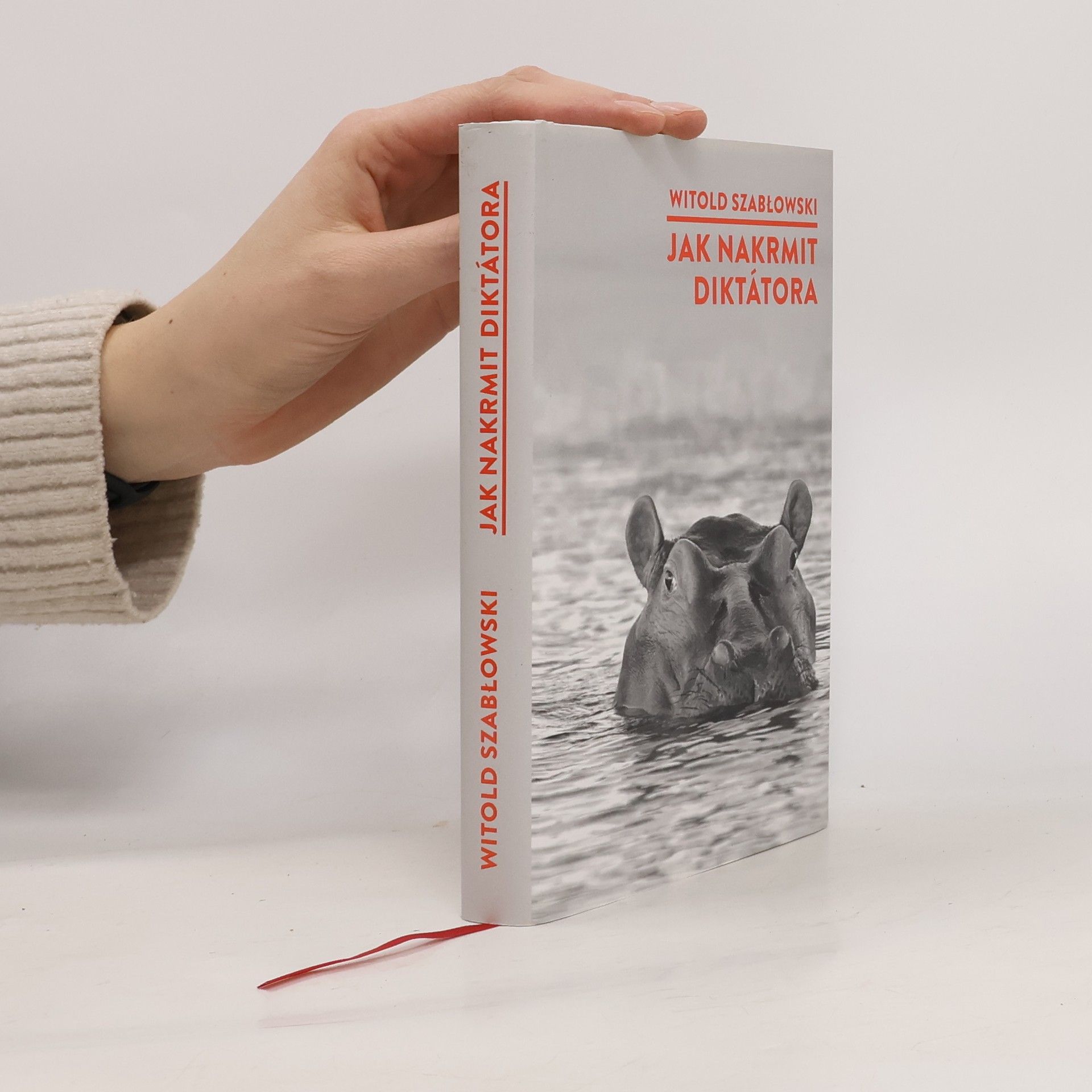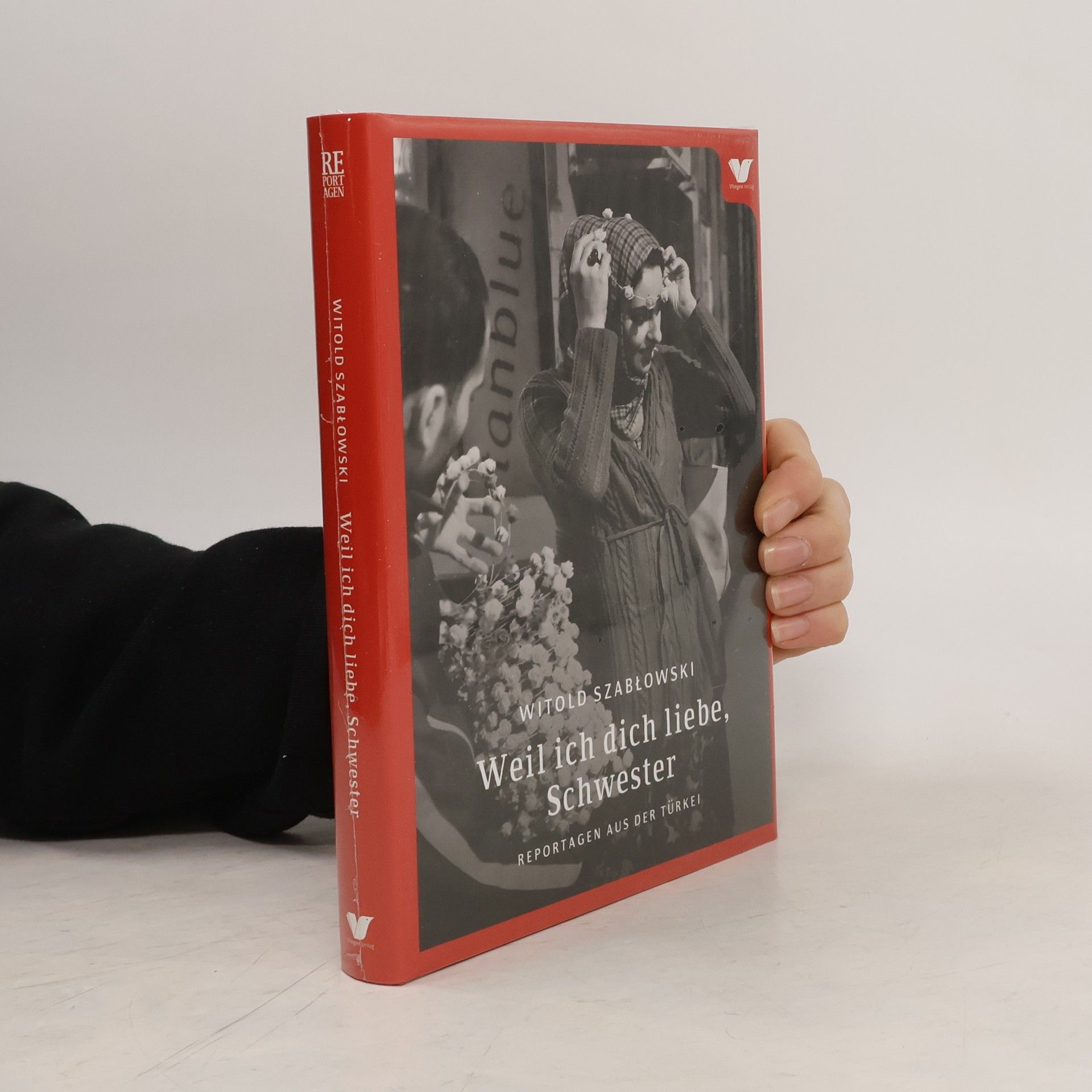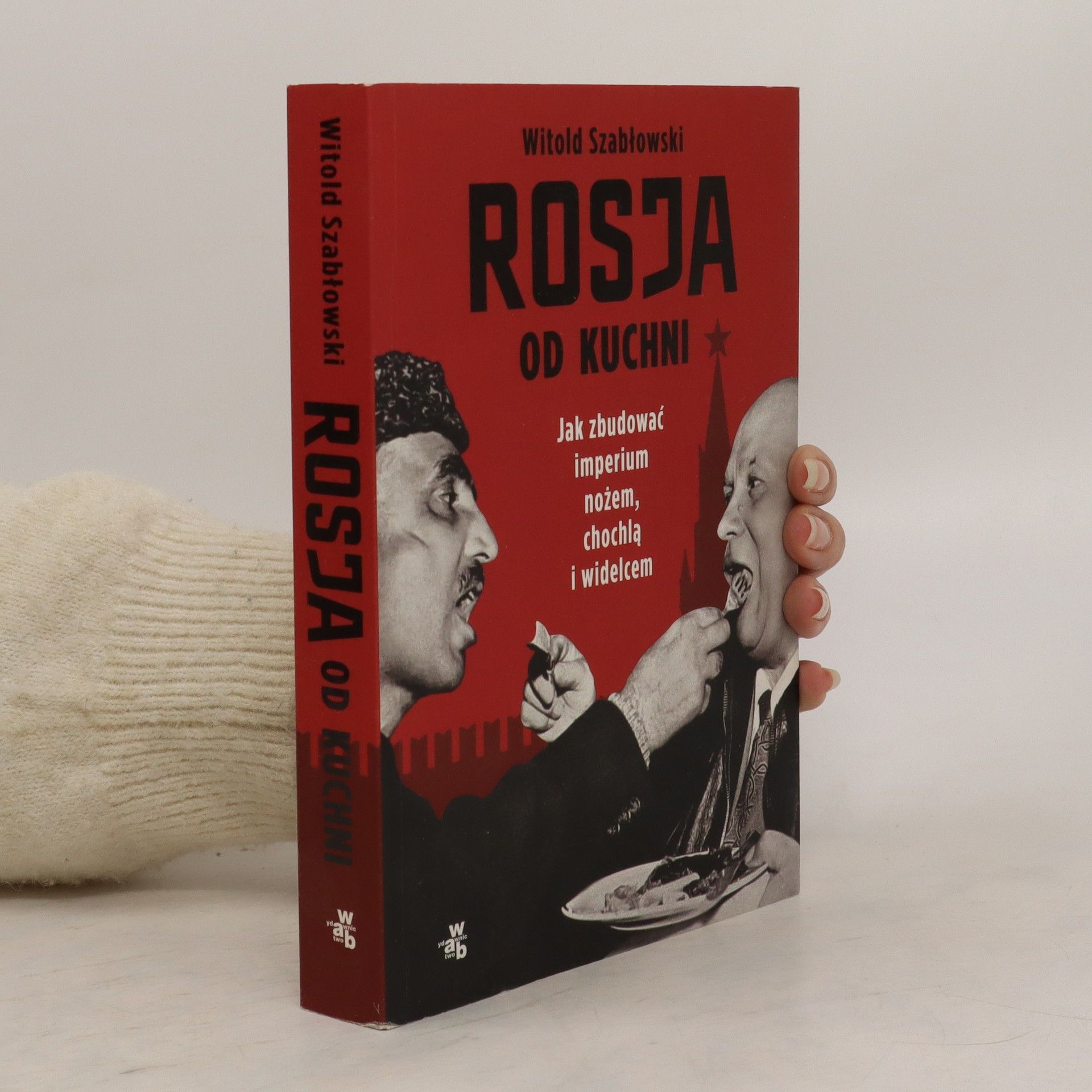What's Cooking in the Kremlin
- 384 pages
- 14 hours of reading
Witold Szabłowski is a Polish journalist known for his in-depth explorations of human stories and societal issues. His work is characterized by a precise journalistic style that uncovers the complex nuances of global events and human experiences. Szabłowski masterfully blends detailed research with compelling narratives to shed light on often-overlooked aspects of the world.







A devastatingly original look at the world's worst dictators, through the eyes of their personal chefs, by award-winning Polish author Witold Szablowski.
Z tej książki dowiecie się, jak – i po co! - kucharz Stalina uczył kucharza Gorbaczowa śpiewać do drożdżowego ciasta. Dlaczego Nina, kucharka z wojny w Afganistanie, zmuszała się, by gotując, myśleć o czymś przyjemnym. Kto wygrał konkurs na najlepszą stołówkę z tych, które powstały wokół Czarnobyla tuż po katastrofie. I dlaczego Breżniew nienawidził kawioru.Przeczytacie o kucharzu i testerze jedzenia Stalina, który toczył z nim nierówną walkę o życie swojej żony. Poznacie przepis na pierwszą zupę, która poleciała w kosmos. I na makaron z turkawkami, którym zajadał się ostatni car, Mikołaj.Przeczytacie też o kuchni ludzi, którzy nie mają co jeść: o Ukrainie, którą Stalin pacyfikował przez głód. I o blokadzie Leningradu.Ale przede wszystkim zobaczycie, jak jedzenie może służyć propagandzie. W kraju takim jak Związek Radziecki służył jej każdy kotlet usmażony i podany w każdej stołówce i restauracji, od Kaliningradu, po krąg polarny i od Mołdawii po Władywostok. Polityczne było zarówno to, co jadł pierwszy sekretarz partii komunistycznej, jak i zwykły obywatel.Rosja jest godną następczynią ZSRR, więc wciąż karmi ludzi propagandą, tak jak robiła to przed laty. I nie przypadkiem rządzi nią Władimir Putin, wnuk kucharza Spirydona Putina. O nich obu też w tej książce przeczytacie.
Nicht erst seit dem Getreideabkommen mit der Ukraine weiß man, was es bedeutet, wenn Russland der Welt mit Hunger droht. Schon immer wurde dort mit Essen Politik gemacht! Witold Szabłowski zeigt in dieser einzigartigen Mischung aus Reportage und Kochbuch, wie – quer durch die Geschichte – Russland Essen immer wieder instrumentalisierte und Hunger zur Waffe machte. Was schlemmten die Funktionäre, während die Genossen hungerten? Was hat Juri Gagarin im Weltraum gegessen? Wovon ernährte sich die Ukraine während der von Stalin verursachten großen Hungersnot? Ein ungewöhnlicher Blick auf Ereignisse, die die Welt bewegt haben – durch die Küchentür.
Reportagen aus der Türkei
Mit seinen fesselnden Reportagen entführt uns der Journalist und Schriftsteller Witold Szablowski in die Türkei – ein Land im Spagat zwischen Europa und Asien, ein Land der kulturellen Vielfalt. Er zeigt uns, wie zerrissen es ist zwischen Tradition und Moderne, Religiosität und Laizismus, EU-Sehnsucht und EU-Ablehnung. In bester Tradition weltberühmter polnischer Reporter wie Ryszard Kapuscinski reist Szablowski quer durchs Land und sucht den Kontakt zu den Menschen. Von Imamen und Feministinnen, Schuhverkäufern und Sexologen lässt er sich die Türkei erklären. Er trifft den Bruder des Papst-Attentäters Ali Agca und ehemalige Prostituierte, die bei der Wahl zum Parlament kandidieren. Von einem unscheinbaren Fremdenführer lässt er sich zu einem Streifzug in die osmanische Architekturgeschichte inspirieren. Und ein Iraker, der vor seiner Flucht als Übersetzer für die US-Armee gearbeitet hat, führt ihn ein in die Welt der Schlepper und Flüchtlinge am Mittelmeer. Die große Stärke der Reportagen liegt darin, dass all diese Menschen selbst zu Wort kommen und ihre persönlichen Geschichten erzählen – der Respekt und die große Empathie, mit denen ihnen der Autor begegnet, sind beachtlich und geben Einblick in ein oft widersprüchliches, aber hoch faszinierendes Land.
Lidé musejí jíst, ať jde o obyčejného člověka, krále či prezidenta. Nebo diktátora. Ani revoluce se nedají dělat s prázdným žaludkem. Witolda Szabłowského napadla otázka, kdo vařil nejhorším diktátorům 20. století, když utlačovali a masakrovali obyvatele vlastních zemí? Co mohou říct o historii lidé, kteří se denně starali o jejich jídelníček? Co měli nejradši Pol Pot, Idi Amin, Milton Obote? Na čem si pochutnávali Fidel Castro, Saddám Husajn či Enver Hodža? A kdo byli lidé, kteří byli diktátorům denně nablízku a snažili se je udržovat jídlem v dobrém rozmaru? Autor vyhledal osobní kuchaře diktátorů, aby vyslechl příběh jejich života a dozvěděl se, co měli pod pokličkami hrnců, když se řešil osud země nebo světa. Ovlivnili svým kuchařským uměním chod dějin? Jejich osudy odpovídají na mnohé otázky, a zároveň tak autor kreslí intimní portréty diktátorů v domácím prostředí. Navíc kuchaři prozrazují recepty na oblíbené pokrmy svých zaměstnavatelů, podle nichž si může uvařit i čtenář. Kniha vyšla s úspěchem zároveň v USA a Polsku a ocitla se ve finále literární soutěže o nejlepší světovou knihu na kulinární téma za rok 2020 (Gourmand World Cookbook Awards).
Ako vybudovať impérium nožom, naberačkou, vidličkouPrečo s posledným ruským cárom Mikulášom II. zastrelili aj jeho kuchára? Čo sa varilo prvým likvidátorom černobyľskej katastrofy? A kto dal Gagarinovi pred odletom do kozmu vypiť pohár mlieka? Spoznajte Rusko cez kuchynské dvere vo vynikajúcej kulinárskej reportáži Witolda Szabłowského!Po úspešnej knihe Ako nakŕmiť diktátora prichádza poľský reportér Witold Szabłowski s jej voľným pokračovaním. Tentoraz vo svojej kulinársko-reportážnej knihe nazerá pod pokrievku Ruska a bývalého Sovietskeho zväzu.Szabłowského kniha Čo sa varí v Kremli vám prezradí, čo jedával Stalin na svojej tajnej dači neďaleko Moskvy, čo sa pieklo v peciach obliehaného Leningradu či aké bolo prvé jedlo vodcov Ruska, Ukrajiny a Bieloruska po rozpade ZSSR. Szabłowski nám však ponúka aj niekoľko „receptov“ z obdobia veľkého ukrajinského hladomoru a v špeciálnom predslove k slovenskému vydaniu nás pozýva „do kuchyne“ v obliehanej mariupoľskej fabrike Azovstaľ.Spoznajte Rusko, krajinu, ktorá buduje svoju moc nožom, naberačkou, vidličkou a... hladom. Asi nie je náhoda, že v krajine, v ktorej sú ľudia zo všetkého najviac kŕmení propagandou, je prezidentom a neobmedzeným diktátorom práve vnuk kuchára – Vladimir Putin.
Další z řady knih polských literárních reportáží přináší vzrušující vyprávění o životě v zemi rozpolcené mezi Východem a Západem, islámem a islamofobií, načichlé konzervatismem a postmodernou, steskem po Evropě a euroskepsí a přibližuje rozporuplnou tureckou mentalitu, její světlé i stinné stránky, vraždami ze cti počínaje a sexuální revolucí konče. Autor si povídá s lidmi, kteří mu mohou pomoci pochopit zvláštní a znepokojující charakter současného Turecka. Každá reportáž je spojena s konkrétním osudem, každý hrdina má příležitost vyprávět svůj příběh, a i když je to pouze střípek barevného světa, jenž nás přivádí do hlubin Turecka, do srdce národa, který – nakažený evropskostí – ztrácí svůj pravidelný, tradiční rytmus, daří se autorovi dosáhnout ideální rovnováhy mezi nekompromisní novinařinou, důkladnou politickou analýzou a humorným příběhem. Jeho reportáže přinášejí dokonalý vhled do reálií současného Turecka, jeho silných stránek, slabostí či paradoxů.
Volyňský masakr – etnické čistky polských obyvatel na Ukrajině, které probíhaly od února roku 1943 do února roku následujícího. Proč sousedé začínají vraždit své sousedy? Kdo a proč v sobě najde sílu zachovat se lidsky uprostřed běsnění? Jak těžké je vybírat mezi „svými“ a „cizími“? Lze zastavit spirálu nenávisti a pomsty? Reportér Witold Szabłowski hovořil s pamětníky tragických událostí přesahujících svou brutalitou naši představivost, studoval archivní prameny a deníky. Jednou z důležitých postav knihy je také Jan Jelínek, český evangelický kněz, který žil od roku 1937 v Kupičově na Volyni. Na své faře skrýval všechny pronásledované: Židy, Poláky i Ukrajince.
V další knize Witolda Szabłowského najdete nezvyklý příběh posledních bulharských medvědářů a jejich cvičených medvědů, kterým sundali řetězy a učí je žít volně, bez drilu. Autor nachází překvapivou paralelu mezi osudem zvířat a vývojem postkomunistických zemí východního bloku. Pomocí metafory nám ukazuje, jak složitá může být cesta ke svobodě pro společnost, která žila dlouhá léta za železnou oponou, a jak nelehké je pro mnohé vyrovnat se s novou realitou. Také v reportážích z Kuby, Polska, Albánie, Srbska, Kosova, Řecka, Ukrajiny, Estonska a Gruzie autor zjišťuje, že je někdy lehčí změnit režim než mentalitu lidí. Při cestách za svými hrdiny například zkoumá v Kosovu reakci obyvatel na čerstvě nabytou nezávislost, na Kubě naslouchá místním, jak se obávají o život Fidela Castra, ve Stalinově muzeu v Gori zas průvodkyním, které vůdce dodnes adorují, zkoumá vztah Ukrajinců k možnému vstupu do Evropské unie, na londýnském nádraží nocuje s polskou bezdomovkyní, hledá rozpadající se albánské bunkry, se srbskou cestovkou se vydává po stopách Radovana Karadžiće? Zdá se, že v jeho příbězích, v nichž nechybí absurdita a černý humor, jsme všichni tančícími medvědy, kterým svoboda přináší úlevu, ale současně také nejistotu a bolest.